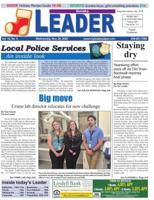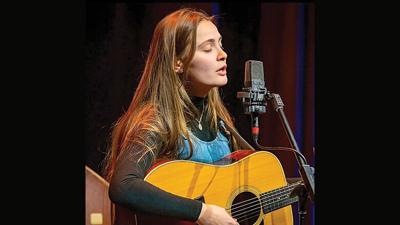When Audrey Neel of Hillsboro first performed bluegrass music as a toddler, she didn’t know she had discovered a passion that would shape her future and immerse her in the past.
Audrey, now 20, is a junior at East Tennessee State University, which has one of the country’s top programs for bluegrass, old-time and roots music.
“I’m double majoring in bluegrass performance and business management,” she said. “I see myself using both to some extent. I want to perform but be able to manage myself in ways that help me financially.”
Her career was kick-started with the March release of her single, “Seesaw,” which she wrote and then performed with the ETSU Bluegrass Pride Band. The tune debuted at No. 17 on the Bluegrass Today charts.
Baby jammer
Informal jam sessions at the former Hardee’s restaurant in Hillsboro gave Audrey her earliest exposure to performing. Her dad, rhythm guitarist Frank Neel, and her older sister, Rachel Ostertag, played and sang with other local amateurs.
Frank said his baby girl showed musical talent even at that young age.
“She would sit on the floor beside me, not even 2 yet, and she’d hum the different pitches when I tuned,” he said. “She’s got a lot of natural ability.”
Audrey started school in the Hillsboro R-3 School District, but finished at Potosi, where her dad taught industrial technology and woodworking. Her skills were honed through a combination of lessons and self-teaching.
“I started playing fiddle on a little toy when I was probably about 3,” she said. “I started taking lessons at about 5.”
The family traveled to a lot of competitions, where both girls performed.
“You could see people thinking, ‘Oh no, we’re going to have to listen to this little kid squeaking away on this fiddle,’” Frank said. “And then Audrey would get up there and just blow them all away.”
Audrey said she took up the guitar in her pre-teens, just “noodling around,” and took lessons in college. She also performed with Potosi school choirs over the years, earning all-state recognition and being named to the first-ever Missouri Collective, a workshop for student songwriters.
She said her experience with multiple genres bolstered her skills in different ways.
“I’m grateful I had the vocal training in classical music because I learned a lot about my voice and how to use it,” she said.
Quick study
Audrey headed to ETSU in fall 2023, the same time alum Tim Stafford joined the faculty as Artist in Residence.
Stafford is a Grammy Award-winning guitarist, songwriter, author and singer. He was a founding member of the famous bluegrass group Blue Highway and of Alison Kraus’ band. He is a three-time International Bluegrass Music Association Songwriter of the Year and winner of numerous other industry awards.
Stafford had Audrey as a guitar student and said he immediately recognized her talent.
“The thing about Audrey compared to other students is the interest she took in my original music,” he said. “I taught her one (of my songs), and she was so enthusiastic and did so well. They’re not easy, but she took to it like a duck to water.”
Stafford also praised Audrey’s commitment to improving her playing.
“She’s really dedicated, really focused. She has a lot of natural talent and she relates well to people,” he said. “She’s been playing a long time, but as far as the progressing goes, she gets better faster than anyone I’ve met.”
The two have played together many times and will be on stage together again soon, he said.
“She got a scholarship for next year and we are going to perform together at the ceremony this summer when they award it to her.”
A complicated past
Audrey said one of the things that fascinates her about bluegrass music is its ties to history and culture, and how every section of the country has organic tunes from historical time points.
“You can find one song with a million variations,” she said. “It depends on the heritage, the style of the musician. There’s a rich scene within the Ozark region. You can trace songs back to players whose parents and grandparents were former slaves, who came here to escape oppression,” she said. “I was studying with a Missouri fiddler, Bill Driver, near Lake of the Ozarks, who helped me learn a lot about it.”
While at ETSU, Stafford taught a course called “Bluegrass Style and Practice.”
“It looked at bluegrass through its antecedents, from Scottish music to gospel to jazz, all the way up to the present. Bluegrass is a relatively young form of music,” he said. “People think it’s old, but that’s because it is based on older forms. It actually started about 1945, the same time as bebop jazz, and it’s gone through a lot of permutations.
“Audrey and I talked about that, because when you write you have to know the history of the music.”
Part of her generation’s focus, Audrey said, is to be custodians of that musical history.
“You find a lot of this music can be traced back to Africa,” she said. “Sadly, a lot of it has been forgotten. A lot of songs from the early years weren’t preserved. It’s a novelty to find tunes that go that far back. There are a lot more recordings now, and we’re seeing more of those being saved.”
Audrey said bluegrass offers a lot of history that’s not taught in schools.
“So much of it has influenced other genres. The same with jazz and blues,” she said. “I think bluegrass gets represented as ‘hillbilly music,’ but it’s just a different skillset from other genres.
“These songs, this music is loved so much. Learning the roots of it, the impact of this music, it’s a powerful thing.”
Onward and upward
After college, Audrey plans to continue performing and learning.
“I’ll continue to write, tour, meet people, build relationships, make connections,” she said. “I probably will move to the East Tennessee area. There’s something about being in the Blue Ridge and the Great Smoky mountains – how rich the music is there, how many people have a common interest with me.
“But I’ve thought about continuing to learn within the Ozark region, too. Who knows?”
Audrey said she tries to give back to younger players in gratitude for the mentoring she’s received over the years.
“This past year, I was part of Junior Appalachian Musicians. JAM is funded by donors and helps kids get instruments and lessons,” she said. “Do I see it as my main occupation? No. But teaching someone is so gratifying.”
Stafford says the sky is the limit for his young protege.
“Kenny Chesney, who I knew at ETSU, was originally a marketing major,” he said. “Kenny took lessons from Jack Cottle, the founder of the bluegrass program, after he saw a poster on campus. If it hadn’t been for that, he might not be in the Country Music Hall of Fame. He might not be in music at all.
“I’m not saying Audrey is going to be the next Kenny Chesney, but there’s a precedent.”
Audrey said releasing her single, written last summer, has been cathartic.
“There were a lot of things going on in my life, a lot of imbalances,” she said. “This relates to how life can sometime be unbalanced, and you have to work to bring it back into balance, and sometimes it just doesn’t work out. It’s not meant to.
“Writing this provided some clarity, and helped me not just with my career, but my mentality.”
The chorus to “Seesaw” illustrates that mindset:
“One is always up while one is down
Always moving faster toward the ground
Waiting for another chance, somebody stop this crazy dance
Until the seesaw evens out.”
The song is available on popular download and streaming services, such as Spotify and Apple Music.
To learn more about Audrey, see her Facebook page or follow the ETSU Bluegrass Pride Band.
“We travel all over to promote our program,” she said. “I also do bar gigs, festivals with my friends. I do solo gigs, too. I’m definitely busy, but it’s what I love to do.
“I’m so fortunate to be given the opportunity to pursue my passion. Life just keeps going up and up for me.”




